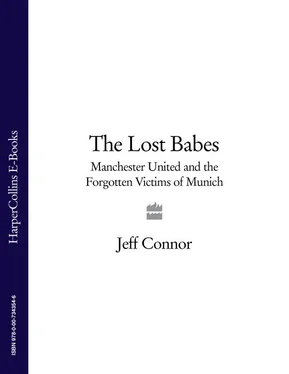Others were also wrapped in services cotton wool and in the early Fifties the Army could field a team of awesome international class—and usually did. Jimmy Armfield did his National Service between 1954 and 1956 based at Lancaster, and later Aldershot, and played in a British Army team that included Bill Foulkes, Colman and Edwards. He recalls gleefully: ‘To be honest, I can’t remember us ever losing and we had a fixture list that included Glasgow Rangers and Everton and we even beat Northern Ireland, who were a very good side at that time. Eddie was a push and run player, he would shuffle and then go into space. He was a very buoyant character as well and I can remember him getting up at the front of the team bus in Germany to lead a sing-song.’
Back in Civvy Street, or rather Archie Street, the little Salford extrovert lived life to its fullest. Dick and Liz Colman proved to be remarkably tolerant and accommodating parents and happily indulged their only son when he organized several memorable parties. Their neighbours soon became immune to the sight of most of the Manchester United first team arriving at the Colmans’ tiny terraced house to drink and dance the night away.
Eddie was also, in his own eyes at least, the club’s trendsetter. While Friday and Saturday-night best for most footballers consisted of ill-fitting jackets and wide trousers with broad turn-ups, Eddie embraced the latest fashions.
‘When I met him he turned up in a duffel coat and a peaked checked cap on and told me he was the most forward dresser of the lot,’ says Harry Gregg. Later, when the teddy-boy craze swept Britain, Colman bought a jacket with a velvet collar and bumper shoes and forsook Sinatra and Sarah Vaughan for Bill Haley and the early Elvis.
Inevitably, he occasionally came close to overstepping the mark, at least in the eyes of some of his seniors.
‘I remember David Pegg and Eddie and myself got home late one night after a party and we were down at Old Trafford next day,’ says Sandy Busby, who socialized with most of his father’s young players. ‘The state they were in. David and Eddie were trying to stay out of Dad’s way, but Dad had a habit of going in the dressing room and going for a pee and usually while he was there he would ask Tom Curry about any injuries from Saturday. He went in the loo on the left of the big bath and came out a couple of minutes later saying: “Tom, tell Pegg and Colman they can come out of the toilets now.” They were unshaven and dying. Dad knew where they had been.’
Dad always knew that. Manchester has always been a village posturing as a large city and as many famous footballers have found since, there have always been spies willing to tittle-tattle, with the hypocritical indignation of the frustrated and the plain jealous, to the hierarchy at Old Trafford. The sum of all the Babes’ misdemeanours probably added up to one week in the life of George Best, but they still had to watch their p’s and q’s when out and about in Manchester. Then they discovered girls.
‘Back in 1957, we used to dance a foot apart,’ Joni Mitchell was to sing much later in a concise summation of courtship of that era when romance was conducted with a space between girl and boy that was not always metaphorical. If they had reason to believe otherwise, most parents would ensure that daughters were home alone by 10.30 pm, that engagements lasted at least twelve months and that permission had to be given in formal fashion by the father of the potential bride.
Girls have been regarded by football managers of every generation as an unnecessary evil. Then, as now, there was no shortage of admirers willing to lead professional footballers off what their clubs would regard as the straight and narrow. By the time of Munich, however, most of the United team was spoken for. Byrne, Bent, Mark Jones, Jackie Blanchflower, Viollet, Gregg and Johnny Berry were married, Liam Whelan and Duncan Edwards engaged. Tommy Taylor and Eddie Colman were ‘going steady’. The only one who looked likely to remain a bachelor for the foreseeable future was David Pegg, the winger blessed with the dreamy-eyed, film-star looks and flashing smile, and a boy quite happy to break a few female hearts without the slightest sign of commitment.
The rituals of courtship went ahead in the hundred or so cinemas, dance halls and nightclubs that enlivened Manchester in the Fifties. The city centre had the Gaumont and Odeon cinemas on Oxford Road and the Gaiety on Peter Street where Gone with the Wind ran for over a year in front of full houses every night. The Empress in Miles Platting, once the Empress Electric Theatre, was another popular haunt while the Cinephone on Market Street was a slightly more risqué venue, earning a dubious reputation for showing ‘foreign’ films with titillating titles such as And God Created Woman or L’Amore . And for the younger, less cerebral, footballers with time on their hands in the afternoon, the masked avenger Zorro and inter-planetary hero Flash Gordon put wrongs to rights in the matinées at the News Theatre on Oxford Road.
Learning to dance properly was a social necessity, too. At the Ritz Ballroom in Whitworth Street aspirant Fred Astaires could hire a professional partner and whirl and twirl in front of a live big band, and there were specialist teachers like Tommy Rogers, who ran a studio on Oxford Road.
‘You worked your way up,’ says Sandy Busby. ‘Going to the Plaza was a big scene. That was on Saturday night. Sunday it would be Chorlton Palais and Levenshulme Palais. There was drink because you needed the Dutch courage to go up and ask a girl for a dance and most of the lads were quite shy. David Pegg was always well groomed, very, very smart. Dave, Tommy and Jackie were always big pals, they used to knock around together. They all had similar backgrounds, all working class, but always very polite, which helped with the girls. If you didn’t get a girl you’d go to the Ping Hong restaurant on Oxford Street, across from the old Gaumont picture house. The Kardomah, Espresso Bongo, Deno’s, the Continental and the Whisky a Gogo were all popular.
‘There was a members’ club called the Cromford in Cromford Court, close by the site of the Arndale Shopping Centre, a place where United’s players regularly congregated, but you had to behave because Dad would go in there. It was a good place to take girlfriends and as long as they weren’t breaking the rules, Dad was quite happy with the lads being there. He’d often send them over a drink. We would go there after the pubs closed to do a little gambling at the tables, watch the floor show, and have a good meal of scampi while it was on.’
The money to feed all this extravagance did go a long way, particularly for footballers who could earn £15 a week, some £9 above the average wage, and the equivalent of around £16,000 a year in modern currency, a sum that would be sniffed at by a Third Division apprentice today. That basic wage could be augmented by a win bonus of £2 and a ‘signing-on fee’ of £10. The captain Roger Byrne’s salary for 1957, for example, comprised a basic wage of £744 from the club, plus league match bonuses of £72, talent money of £45, European Cup bonuses of £60 and an accrued benefit sum of £150. While not actually rolling in the stuff in the manner of his 2005 counterpart Roy Keane, Byrne could be said to have been comfortably off. And unlike many before or since, he had already worked out that he could not play forever, that a footballer’s career was far from finite. He had a newspaper column in the Manchester Evening News , several minor sponsorships including a Raleigh bicycle endorsement and, in the cerebral manner that always attended his play on the football field, was already, as 1958 and his twenty-ninth birthday approached, planning for a life outside football.
Читать дальше












